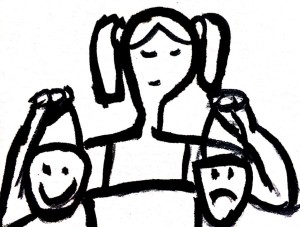In my day-to-day life I talk about this kind of abstract concept a lot, this concept of being emotionally present. A skill I see in almost all leaders, talented public speakers, live theatre performers, and most physiologists. A skill that, if used correctly, can open many doors and allow you to connect fully with people wherever you go. You might be asking yourself at this point, “If it’s that simple then why don’t most people do it?” The simple answer: it’s hard. Let’s start out by defining emotional presentness: Emotional presentness is the ability to be empathetic, to feel, to connect, and to share personal energy on an intellectual level without speaking. Emotional presentness and being present with your audience influences and improves public speaking.
I promise you’ve seen and felt this before. The people you converse with whose eyes land on everything in the room other than the person they’re actually talking to, you. You feel it in people who look into the eyes of another person when they speak. You feel that their grounded, and that they’re there with you, that they are present. Renee Brown defines authenticity as “a collection of choices that we have to make every day. It’s about the choice to show up and be real. The choice to be honest. The choice to let our true selves be seen.” In my words, that means taking risks and putting yourself out there, but it also means being present in everyday life and in everyday conversations.
In high school, things that reduce or alter emotional feeling become especially prevalent as a coping mechanism. We’re all running so quickly into college that we forget how to honestly connect with one another. Numbing substances, such as alcohol, social networking, texting while someone’s talking to you, etc., allow you to escape what’s happening around you. A little numbing and emotional relief can be great – safe even – but look around you, turning emotional sensitivity down has become the norm. Teachers speak from the backs of their skulls, friends hide what they’re really feeling by saying “I’m just tired.” When was the last time you really felt what someone was saying?
Why is it that we all long for connection, yet we’re so scared to connect with one another?
It’s time to start. It’s time to start shamelessly caring and loving, even unreciprocatedlty. It’s time to start listening and feeling for other people. We’re all weak; that is the truth. Not a soul is without struggle. We refuse to open doors into new spaces because it scares us. We’ re terrified that the moment we start speaking and connecting, it will be too much for anyone to handle, or worse, no one will care. That’s not the truth. We have to stop shutting down. Our relationships are more successful: we are more successful when we show ourselves and become united in a way we couldn’t when we had the armor or emotional protection. It’s ironic: we search for validation and emotional satisfaction yet were incapable of giving both. As a member of a coalition we must achieve together. The only way to do that is through empathy, mutual admiration, and vulnerability. We need to start living, really living.

I absolutely understand the fear we all feel when we are vulnerable- when we dare to connect and share our authentic selves. However, when we make the choice to be present, we can experience true, beautiful connection with the special people in our lives. I agree that we need to support each other in our vulnerability. My greatest fear is not the lack of personal validation; my greatest fear is missing opportunities in my life to truly care, to be compassionate, and to share authentic connection. Great article!